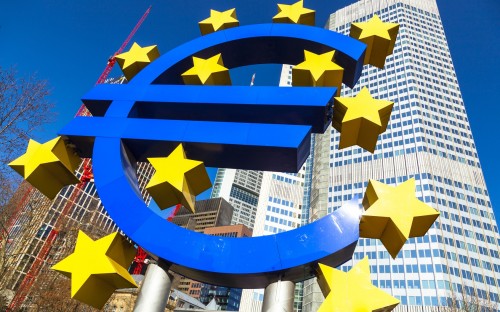His two-week trip, scouring states from Washington to San Francisco, was no great secret.
Many more French business schools make the same trans-Atlantic flight in the summer months, in a bid to scoop up wealthy American graduates for post-graduate degree programs in Europe.
Eric’s trip was part of a wider effort to tap into the American market. He has spent the past five months convincing candidates to try the French way of business.
His European business school, like many others, wants to ramp-up its international recruiting efforts. The IMF expects the eurozone to regain momentum with a 1.1% expansion this year, while it predicts the UK economy will grow 3.2%.
The US, the largest candidate market, is now a fat target. There is a view in Europe that American candidates are ripe for the picking.
Increased confidence in the Eurozone’s economic recovery has buoyed business schools which have long struggled to lure talent to European shores.
“They don’t realize there are MBAs abroad – that it exists, and that it’s possible to do it in English,” quips Eric, who recruits for ESSEC Business School’s Global MBA program.
In the US, it is not instinctive for managers to seek out European MBA programs. Domestic schools rule the roost.
The UK claims a huge slice of the applicant pool, while other countries such as France, Spain and Italy, while fantastic educators, do not share the same lustre.
Europe experienced a surge in demand in the immediate aftermath of the financial crisis, as managers sought to ride out the storm and emerge ahead of rivals in the jobs market. But applications levelled, and some top-ranking schools began to struggle.
Pejay Belland, director of admissions at INSEAD, says: “The continued economic uncertainty in Europe has certainly played a role in the decrease in applications that many schools have experienced… As the recession continued applicants became more risk averse and were less likely to leave their jobs to embark on an MBA.” He did not suggest INSEAD had experienced a drop.
There are signs now, however, that the tide is turning. MBA candidates are once again drawn to Europe. Enhanced job prospects and confidence in the recovery has contributed to applicants considering Europe in greater numbers.
Asia Pac continues to gain ground, but Europe’s countries are regaining their standing against the Asian titans of China and Singapore, and emerging players like Australia and Canada.
According to new QS data released last week, France is now picked by 25% of candidates as a potential destination, up on last year, and Spain is a choice destination of 20% of candidates.
Fledgling MBA markets which have seen notable increases in demand, including Denmark - and the rise of Germany - are beginning to mark their mark.
“Candidates are looking across the globe for their business education,” says Keegan Pierce, associate director of international admissions at Spain’s ESADE Business School.
At the same time, candidates are considering a greater range of destinations, and are applying to up to five business schools at a time. All of which bodes well for Europe.
Jonas Revensburg, an admissions officer at Swiss business school St. Gallen, says: “The fact that we now [have] more applicants coming from further afield is clearly an advantage to us and our corporate partners.”
For Jonas, business in Switzerland is booming. Applications have jumped up in the past few years, he says, partly in response to non-Swiss managers willing to take a risk and spend a year out of work in Europe.
More than 90% of the MBA class is from outside Switzerland.
“The huge financial obligation has to look like it will pay off in the longer term, and confidence in Europe’s economic stability is a strong factor,” Jonas says.
More than 60% of 2014’s class found work in the country, he adds, and a further 27% were employed within the EU. “They appear to want to study close to where they can find great career opportunities.”
The picture is similar across the rest of the Continent. Applicants who chose a study destination based on where they want to work has increased from 41% in 2011 to 51% today, according to QS data.
MBAs are increasingly interested in “international careers” – but the vast majority will, immediately after graduating, seek work in their business school’s country.
Santiago Garcia, director of recruitment and admissions at Grenoble Ecole de Management, says: “The worst of the European economic crisis might now be over, and candidates start seeing not only the global opportunities a prestigious degree will give them, but also the possibilities in the countries where they get their degree.”
The leading French business school has seen a steady increase in MBA and master students, Santiago says, but strongly denies that the financial crisis had a negative impact on recruitment. “Established schools are global, regardless of the physical location.”
In spite of that view, many European schools are keen to trumpet a roaring return to the top of the international stage. All sources have noted strong increases in the diversity of their MBA classes, diversity on which they thrive.
But with more mobile candidates, there is more competition for schools to secure the best talent.
“It’s a more competitive process – we have the same candidates applying to several schools,” says Pilar Vicente, senior associate director of admissions at Spain’s IE Business School.
She adds that since 2008, the school has seen an increase in applications year-on-year. But Pilar points out that for IE, location is not the top consideration for students.
Eric from ESSEC says: “Since the crisis… In Europe the trend seems to be things are slowing down – it’s a more competitive market. There are fewer companies who are willing to sponsor it [an MBA], so there’s an overall smaller candidate pool.”
Anna Bacigalupi, an admissions manager at MIP Politecnico di Milano, the Italian business school, says it has become “very challenging” because MBA candidates are seeking out programs which incorporate a long exchange program abroad.
“Candidates are not satisfied to attend an MBA in just one country,” Anna says.
This is a view shared by many other European schools. At INSEAD, candidates sign up in-part because they can study in two different regions, Europe and Asia, with the option of also spending time in the Middle East and the US, says Pejay. “In other words, they are drawn by the global experience.”
Europe’s preferred one-year method of delivery is gaining traction in the US, where most MBA programs are spread over two years – often costing twice as much.
There are also wider concerns about the return on investment of these US degrees. A recent study by The Economist found that most European MBA programs offer a quicker cash return.
HEC Paris topped the list – MBA graduates of the French school make enough extra money to pay off their degrees in less than two years of work.
Eric says that the smaller class sizes which are a typical theme in Europe also bode well for MBAs. “During corporate connections – if you want a visit at BNP Paribas, how many people are trying to get that handshake at the end of the talk?”
As economies continue to gather steam, Europe’s business schools are likely to continue to benefit. For MBA candidates who consider branching out further afield, the future may be bright. But there is still some way to go.
“In north America, the largest market for MBAs, they are just on the brink of discovering that there are MBAs in other parts of the world, taught in English and accredited,” Eric adds.
“I think this is a larger trend – and it’s a positive thing for ESSEC because we’re tapping into the American market.”
RECAPTHA :
23
63
fd
da








